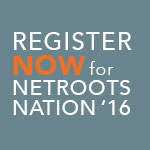After a great run, the Winning the Internet blog has been retired. However, you can still keep in touch with New Media Mentors here.
 It’s been about three years since we launched New Media Mentors – and we’ve tasted a bit of our own medicine, “learning by doing” along the way.
It’s been about three years since we launched New Media Mentors – and we’ve tasted a bit of our own medicine, “learning by doing” along the way.
We’ve bumped up against what does and doesn’t work, changed and developed our program based on what we found out and discovered key challenges that most organizations face.
We’ve seen first hand why online work needs to be woven throughout an organization and the power of doing it right. We’ve also seen that new digital leaders not only have great impact on their own organizations, they have an impact on the sector as a whole.
What follows are some lessons learned. We hope our “bird’s eye view” (working horizontally across the sector and vertically inside organizations,) will be useful to: organizations that don’t know the challenges other groups face (often similar,) and those who want to improve their online work or are curious about what it takes to win online.
Our learning:
Organizations are a work in progress. Nonprofits aren’t always clear about their organizational goals, and staff changes are more the norm than not. What we’ve found in our work so far, though, is that you can change the “dna” of an organization by working over time with them, on their internal processes, culture and leadership. This means working with executive directors as well as line staff.
Learning is a day in day out proposition. Discovering what’s possible is just a small part of learning. It takes applying ideas and strategies to real world, day- to- day activities to learn best practices and to work strategically. The learning process and integration of new knowledge happens over a period of time with successes and failures along the way.
Online work goes way beyond the online team. Our work with organizations is like pulling a thread. While we work throughout the mentorship with a primary contact, (typically the digital or communications director) the work leads us to all parts of the organization. That includes decision-making, internal systems, strategic planning, and leadership. All of these parts – leadership, culture, knowledge are integral to what it takes to do online advocacy effectively. (It’s not just the job of the digital director.)
The time to think is not to be underestimated. For the most part, groups spend their days putting out fires; running from meeting to meeting and task to task. There’s little time to step back, evaluate the work and change course based on that information. The discipline of pulling to the side of the road -that is, making the time to evaluate and think – is a core part of success and must be built into the program.
The strategic framework is not new, it’s just not always applied. Most of the groups we work with are familiar with the steps of designing successful campaigns (from setting goals to identifying tactics) but they’re not necessarily applying this to their online work. Also, groups often struggle to use strategic planning to connect online work to the organization’s campaign goals.
People count the numbers, but they don’t know what to do with them. So many groups have someone “reporting” at weekly staff meetings or monthly calls on the number of responses, likes, re-tweets, sign ups, signatures or other metrics that they collect. But most of the time, they’re not using that data to guide their work. There’s no analysis and/or application, so the numbers (alone) don’t mean much.
New toys are a lot more fun than failure. Doing something for the first time isn’t always easy. It takes experimentation, practice – (sometimes failure) and evaluation to get it right. On the other hand, new “toys,” such as the latest apps or platforms can be a big waste of time. For each organization, it’s not always obvious which is which. Groups often need help understanding the value of specific tools and technologies.
They’re doing it anyway so they should do it right. Online advocacy is a cornerstone of work for many groups fighting for social change. They’re investing time and resources, on social media, social action technology and tools. As long as they’re spending resources, they may as well do it right. It will mean time and money saved and much greater impact over the long run.
Over time we see our work as greater than the sum of its parts. New Media Mentors is not just about the individual groups we mentor. Developing new digital leaders makes the sector stronger as a whole.
We hope to work with many more of you in the years ahead.




Comments are closed.